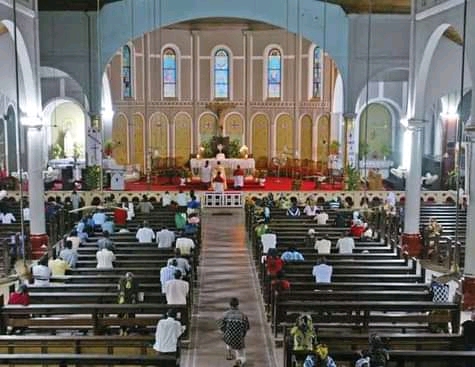By Nnamdi Elekwachi
On the Catholic Priest and Ban of Igbo Songs
Reverend Father James Anelu who banned Igbo songs in his parish did not pronounce his religious odium towards the Igbo alone, he voiced what many of his ilk had nursed but remained silent to speak. If indeed there is such deep-seated hate in a priest for a human group, it stands to reason and is therefore conveniently safe to say that the Igbo who worshipped in the said parish before now were themselves guilty by association. Had Reverend Father James Anelu himself not told us that he is a thoroughgoing Igbophobe, unapologetically? He did us all a whole world of good to have come clean or to fess up!
Before my divorce (and I’m still contemplating going back) from the church, I had been to parishes in Aba where the Eucharist was celebrated in Latin liturgy countless times and also where Hausa songs or songs in Efik or Yoruba would rend the air with parishioners only ‘joining the chorus.’ In fact, my aunt who wedded 2001 in Aba commissioned Our Lady of Lourdes Parish choir to sing, as a special number, certain Hausa song ‘Mun Gode Allah,’ which first line went: ‘Domin ka kawo mu a wannan ranan yau.’ On her request, it was sung for her after the offertory since it was her day (wedding), though not without a token of ‘appreciation’ to the choir. That was some twenty-one years ago at a parish located in Aba. Even today, I am sure too that that very song is still being used virtually everywhere in all the Nigerian Catholic churches .
More extreme than Catholic traditionalists who insist on a return to Tridentine Mass (Latin Mass) as against other languages, Anelu, for whatever insular convinction he has and holds ordered that Igbo songs should not be heard in his parish. But the joke, ironically, is on Anelu who forgot that the church herself was born – on the Pentecost Day – when, according Christian tradition, the Paraclete descended like ‘tongues of fire’ on the heads of the apostles, such that they spoke in different tongues, not even one.
That was the first day of the church whereupon some three thousand souls were won, and at any rate, let us not forget that passersby who saw the men/women filled with the Holy Spirit asked, ‘Are not these men Galileans…?’, meaning that even though they were from Galilee, the apostles were speaking other tongues – glossolalia!
So, the church was not born in one language. Again, available historical data tend to show that had he existed, Jesus who probably lived, walked and worked his wonders in Palestine, might have spoken Aramaic, not Latin or Greek. The fact remains that when the Holy Roman Empire collapsed during the AD 470s, one of the reforms the church would undergo in later decades and centuries was her liturgy.
The Catholic traditionalists today still insist that Latin be used in officiating the Mass, a culture which isolated the laity much and concentrated the Missal and other canticles on the clergy. Howbeit, Latin was never the official and original language of the bible text. Saint Jerome of the 4th century translated the Greek text to a Latin vulgar standard known as ‘Vulgate.’
Again, the Second Vatican Council of 1962-65 allows the Mass to be said in local languages so that it is indeed celebrated for the people, not like during the era of ‘the Mass of the Apostles,’ when a priest said everything in Latin. Was Reverend Father James Anelu unaware of the canon adopted at the Second Vatican Council or is he now the church over and above Cephas (or Peter) to whom the saying went, ‘Ubi Petrus, ibi ecclesia’ (Where there is Peter or Rock, there is church)?
Anelu misses the doctrinal assumption of the ‘universality of the church,’ that the church does not grow as the body of Christ by excluding groups. After all, did not the gospel go to the Greeks as the Jews reject same, as it is said?
I think the trend now, from Fatoyinbo of COZA, another Lagos church, to Anelu shows that the Igbo are guilty by association, that even the unborn of them suffer this collective guilt now evident in the House of God. Quo vadis Christianity?
I’m off to Timbuktu
